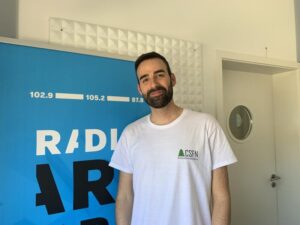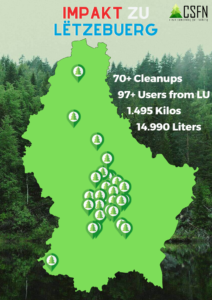From plogging to app logging: the evolution of litter picking with César
The journalist Mrs Tracy Heindrichs welcomes to #EcoTalks, your definitive source for all things nature, climate, and environment from ARA City Radio. Today, we’re honored to host César González Fernández, the founder behind Clean Something for Nothing – a movement that’s changing the face of litter picking and community cleanup initiatives.
Tracy Heindrichs: It’s great to have you on board, César. For those unfamiliar, could you shed some light on Clean Something for Nothing and its connection to our environment?
César González Fernández: Thank you, Tracy. Simply put, we aim to unite individuals globally to clean our planet—one bag of trash at a time—via our mobile app. Our mission resonates deeply with environmental and climate concerns, ensuring we leave a cleaner footprint behind.

“It’s not my trash, but my planet. We focus on being part of the solution.” — César González Fernández
Tracy: How did your journey begin? How long has the company been operational?
César: I started litter picking in 2018. Over time, it became part of my routine. The company itself consists of Lester, our technical genius, and me. He handles app development while I steer the business, cleanups, and marketing aspects.
Tracy: I’ve seen the app’s mention on your website. Could you delve into its mechanics?
César: Certainly. The journey began in 2018 with my first litter pick. Realizing its societal impact, I explored online communities and found a burgeoning plogging movement. The hashtag #CleanSomethingForNothing on social media was our inception. Witnessing its virality, we felt the need to consolidate these global efforts. Despite multiple apps in the market, none seemed user-friendly. Leveraging Lester’s expertise, we extracted the best features from other platforms, collected feedback from prominent litter pickers, and then fashioned our app.
“Clean Something for Nothing started as a hashtag, a clarion call for collective action against litter.” — César González Fernández
Tracy: The term “litter picker” seems specialized. What exactly does it entail?
César: It’s straightforward. Equipped with a trash bag, one ventures into nature, gathering discarded trash. The motto we uphold is clear: it’s our collective planet. We emphasize proactive solutions over finger-pointing.
Tracy: And how does one engage with your app?
César: The app is structured in three steps: pick up trash, photograph your collection, and log the number of bags. It mirrors social media platforms like Instagram but with the inclusion of bag count. We also provide a convenient way to measure volume and weight, ensuring users can seamlessly log their contributions.
Tracy: When did this innovative platform come to life?
César: We launched it in February of the previous year, in 2022.
Tracy: From its humble beginnings to its current scope, how has the engagement with your app grown since its launch?
César: We started with just a handful of users, mostly connections from Instagram. But even in the early days, they were instrumental in providing feedback. In the beginning, we might have only logged about 1000 kilos of trash in a month. Fast forward to now, and that number has soared to 10-20 thousand kilos monthly. It’s heartwarming to see individuals making such a collective difference.
Tracy: So, if someone’s vacationing in Barcelona and feels inspired to pick litter, can they use your app there?
César: Absolutely! While many initiatives start local and expand, we went global from day one because of the international nature of the problem. To date, users from 53 countries have documented a staggering 479,000 kilos of trash. The sheer volume, just thinking of it as litter and not household waste, is truly mind-boggling.
Tracy: Critics often argue about the need to share every environmental act on social media. What’s your stance on this?
César: I strongly feel that those who critique haven’t engaged in litter picking extensively. When I browse my Instagram, I see countless acts of goodness. Sharing these moments builds a community. It’s not about seeking validation, but about knowing there’s a global support system. It’s powerful to realize that irrespective of our cultural or geographical differences, we’re united by a common goal – a litter-free world.
Tracy: The term “community” recurs in our conversation. Are there active litter-picking communities in Luxembourg?
César: Indeed, we have some fantastic NGOs like ‘Serve the City Luxembourg‘, of which I’m a board member for environmental affairs. Alongside passionate colleagues, we organize bi-weekly litter picking sessions in various districts of the city. In two years, with our amazing volunteers, we’ve managed to pick over 1500 kilos of trash. We also look forward to collaborate with ‘Pick it Up Luxembourg‘, based in Esch-sur-Alzette. I’m always eager to connect with new litter-picking groups or individuals looking to make a difference.

Tracy: Speaking of community, what are your observations about littering habits in Luxembourg?
César: Litter is a universal issue. A concerning habit I’ve noticed is the casual discarding of cigarette butts. Many don’t think twice before flicking a cigarette onto the ground, perhaps an act normalized by popular culture. Cigarette butts remain a significant concern not just in Luxembourg, but globally, especially in areas like bus stations or outside buildings. I’d like to remark the work done by Shime with the Zero MéGo campaign and their recycling stations that are available in our CSFN app.
Tracy: Your app was initially for individuals. But I’ve noticed some upgrades. Can you tell us more?
César: We’ve evolved the app to involve not just individuals, but entire communities. Schools, companies, and municipalities are now part of the solution. We provide educational materials for schools, enabling students to engage in plogging activities using our app. Companies can use it as a team-building activity, while municipalities gain insights into the litter situation in their region.
“We believe litter is an issue that affects all of us. So, schools, companies, municipalities—we want to involve these sectors to be part of the solution.” – César González Fernández
Tracy: Speaking of communities, what’s the idea behind the group feature?
César: The group profile was initially for NGOs and local cleanup groups. We wanted to streamline their efforts and provide detailed reports to foster their interactions with municipalities and organizations. With this feature, friends can now clean together or alone, all while being part of a larger community initiative.
Tracy: Could you see nationwide competitions, like in Duolingo, where companies or communities compete to pick up the most trash?
César: Certainly! We’re inspired by Duolingo’s gamification. We are contemplating challenges among companies, but in a collaborative spirit. Two competitors, for instance, could join hands to achieve a set cleanup goal, celebrating their collective efforts. Remember, litter picking isn’t just about cleaning up—it’s also about community, exercise, and self-reflection.
Tracy: Any advice for those hesitant about litter picking due to hygiene concerns?
César: It’s about doing what you can. Carrying a small trash bag and a pair of reusable gloves is a great start. Even if you pick up a handful, you’re making an impact.
Tracy: As we wrap up, any final words on the CSFN initiative?
César: I urge everyone to give litter picking a try, and our app can be a great companion in this journey. Also, watch out for World Cleanup Day on September 16th. I’ll be representing Luxembourg, and there’ll be numerous cleanup initiatives that month.
“Give litter picking a try, and our app can be your companion. Surround yourself with like-minded people and make an impact.” – César González Fernández
Ready to Make a Change? 🌱 Dive into the world of litter picking and join a community committed to a cleaner future. Download the Clean Something for Nothing app today and let every trash bag you fill be a step towards environmental rejuvenation. Share your journey using #CleanSomethingForNothing!
You can listen to the whole interview at ARA city Radio here!


